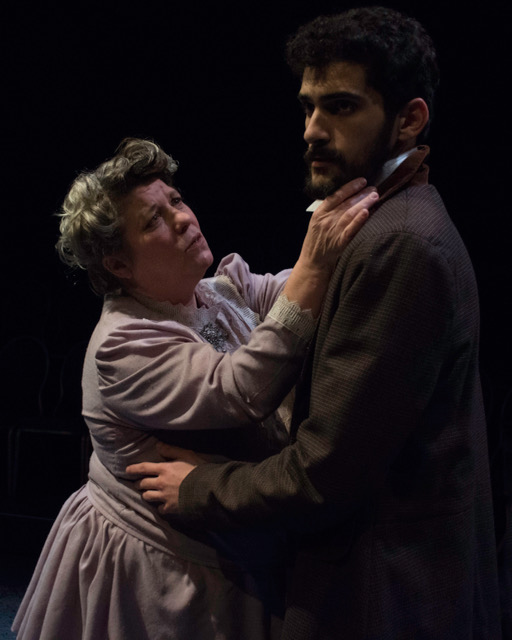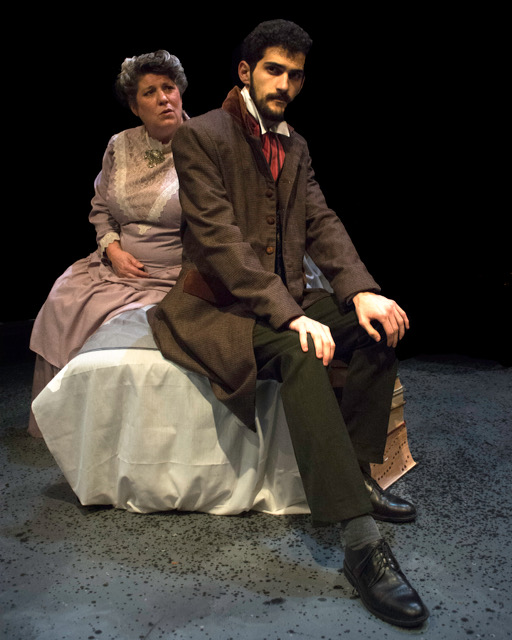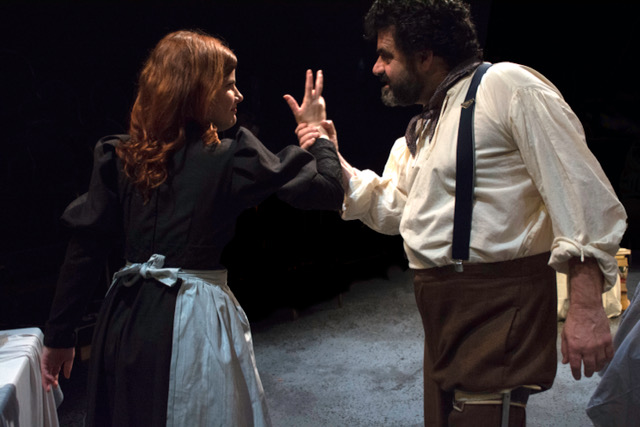
Credit: Nancy Caldwell
At the Jericho Arts Centre until November 27, 2016
604-224-8007/unitedplayers.com
Posted November 13, 2016
Fresh is not a word often applied to a production of Henrik Ibsen’s Ghosts. But directed by Michael Fera for United Players, that’s exactly what this production is: fresh. It’s also relevant despite its late 19th century setting in Skien, Norway.
Written in 1881 in Danish by the great Norwegian playwright, the script was offered at the time to various European theatre companies all of whom turned it down because of its subject matter: syphilis (although the word is never used in the play), incest, criticism of the church, sex outside marriage, divorce and euthanasia. And so its world premiere was not in Norway or elsewhere in Europe but in Chicago, Illinois in 1882; productions followed in Sweden, Berlin and London (in 1891) where The Daily Telegraph reviewer had this to say: “Ibsen’s positively abominable play entitled Ghosts…. An open drain: a loathsome sore unbandaged; a dirty act done publicly…. Gross, almost putrid indecorum…. Literary carrion…. Crapulous stuff”.
Ibsen has been called the father of modern drama and it’s amazing how contemporary Ghosts – an English translation of the title that Ibsen never liked – feels. (According to the playwright, a more accurate translation of the Norwegian gengarere would be ‘The Ones Who Return’).

Credit: Nancy Caldwell
One who has returned is Oswald Alving (Francis Winter) who had been sent away as a child by his mother Mrs. Helene Alving (Tanja Dixon-Warren) to prevent the boy from being corrupted by his philandering father, the late Captain Alving. Unhappy in her marriage, Mrs. Alving had, years ago, been determined to leave her husband but was persuaded by morally upright/uptight Pastor Manders (Linden Banks) to stay with her husband out of a sense of Christian duty.
Now, years later, it is the eve of the opening of an orphanage funded by Mrs. Alving. Oswald has come home but he is ill; worse, he’s begun dallying with Mrs. Alving’s maid Regina (Elizabeth Willow) and behaving much as his father had.
Perhaps Captain Alving is another one who has returned or, at least, his penchant for promiscuity has come back to haunt the son. Winter, stylishly dressed, makes Oswald’s mood swings credible. We get it: something is dreadfully wrong with Oswald.
Dixon-Warren as Mrs. Alving is maternal in an almost Freudian way as she pulls Oswald to her breast and cradles him. But Dixon-Warren also brings an opinionated, New Woman aspect to Mrs. Alving as she spars with Pastor Manders over the books she’s reading. She’s a sympathetic, nuanced character confronting a huge moral dilemma.
Ghosts is, to some extent, Ibsen’s exploration of Nora (in A Doll’s House) had Nora not abandoned her husband and children to escape a miserable marriage.
As Pastor Manders, Linden Banks initially presents a decent man but soon the cleric’s conservative, patronizing, interfering views become apparent and thoroughly odious. Banks stepped into this production only days before opening due to a medical emergency with the original performer. He manages well and when reaching for lines he cleverly makes it part of Manders’ speaking style.
Elizabeth Willow makes a spritely Regina with her pragmatic, looking-out-for-number- one attitude; Michael Vairo is a blustery, roguish Jacob Engstrand.

Credit: Nancy Caldwell
Production values are excellent with Michael Fera and Linda Begg’s set design lit by Graham Ockley and period costumes by Caroline Cheng and Linda Begg.
Dusting off this one hundred and thirty-five year old script, director Fera, his cast, crew and design team breathe new life into Ghosts in a face-paced, no intermission, eighty-minutes. It raises contemporary issues in a non-didactic manner. As the lights fade, Oswald calls out for “the sun”. Oswald (and the playwright) are calling for light to shine into all the dark, dingy corners of a hypocritical society: speak the unspeakable and, fully informed, squarely face the future. What, exactly, does that mean for Mrs. Alving? Ibsen and director Fera leave the question tantalizingly, provocatively hanging.

